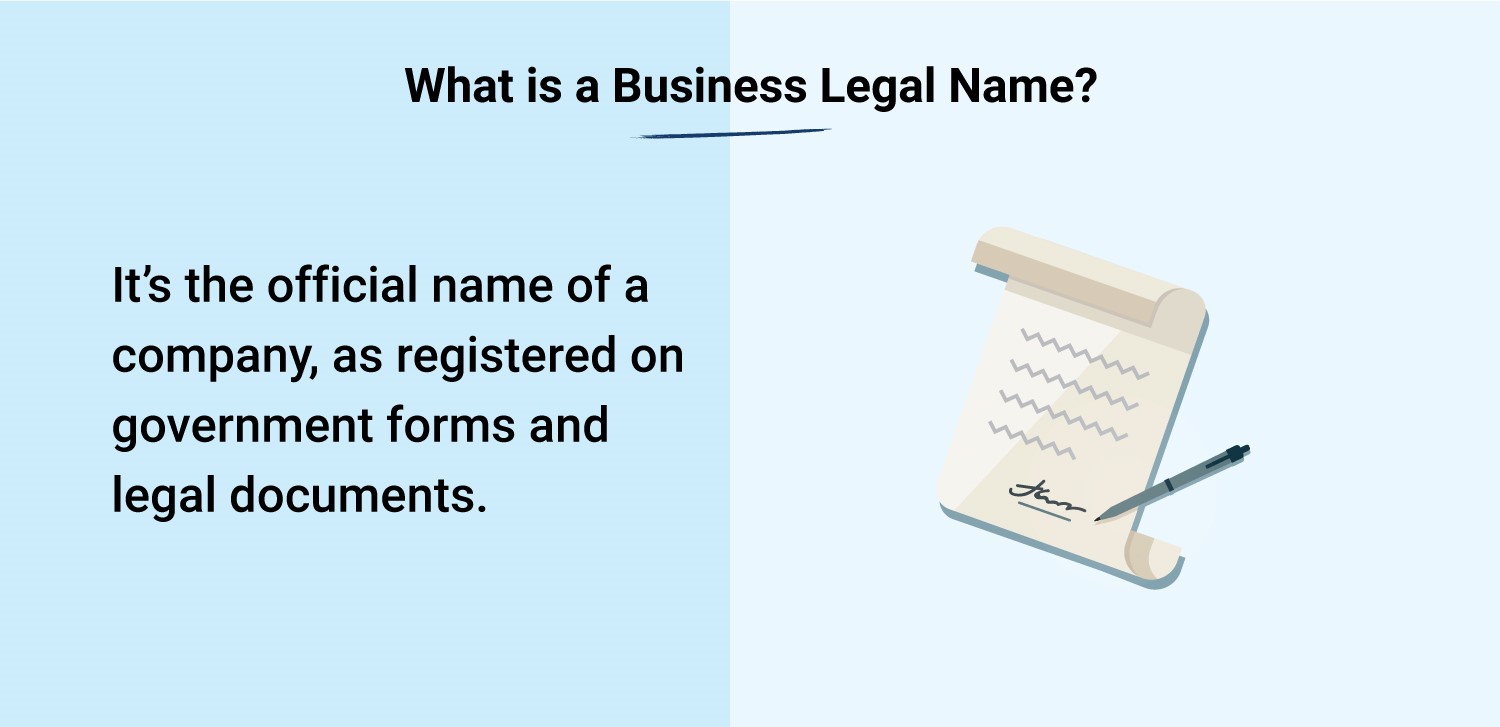
Business legal name vs. trade name: What’s the difference between the two? Which one should you use? Can you use both?
These are common questions you might have as a new entrepreneur.
We’ll give you all the answers.
Your business legal name is one of the first things potential customers notice.
But most times, the name you legally register is not the name your customers know you by.
Take Walmart, for instance.
Its legal name since 1970 was “Wal-Mart Stores, Inc.” up until 2017 when they officially changed it to “Walmart Inc”. But for all those years, almost everyone knew it by another name — Walmart.
Another example of a trade name is UPS.
Its business legal name is United Parcel Service of America, Inc., but you’ll hardly hear anyone referring to it by its business name.
These examples give you an idea of the difference between a business legal name and a trade name.
If you are like most new business owners and entrepreneurs, you often get confused between the two types of names, and whether it’s necessary to have both.
In this post, we end the business legal name vs. trade name debate once and for all.
Let’s get started.

A legal business name is the official name of a company, as registered on government forms and legal documents.
When you register your business entity, the name that you use for all legal contracts like filing for your Employer Identification Number (EIN) and financial documents like loan documents is your business legal name.
There are certain guidelines that you need to follow when choosing a business’s legal name.
Please note that these legal requirements may differ from one state to another.
You need to check the naming requirements for registering your business legal name with the state and local authorities.
There are several ways through which you can register your business legal name to protect it:
Registering your business legal name at the state level prohibits any other entity from using the legal name you submit for your business.
It protects your company name at the state level.
All you have to do is choose a business structure like a Limited Liability Company (LLC), Corporation, or Partnership in your state if you:
Most businesses only need to register with the federal government to obtain a federal tax ID (EIN).
But if you want trademark protection of your business legal name, file that with the United States Patent and Trademark office.
A trademark registration gives you exclusive rights to the use of your business legal name in connection to the goods and services you identify during the registration.
The trademark legal protection gives you the exclusive right for the company name countrywide.
Here are some indicators that you’ve chosen a great business legal name:
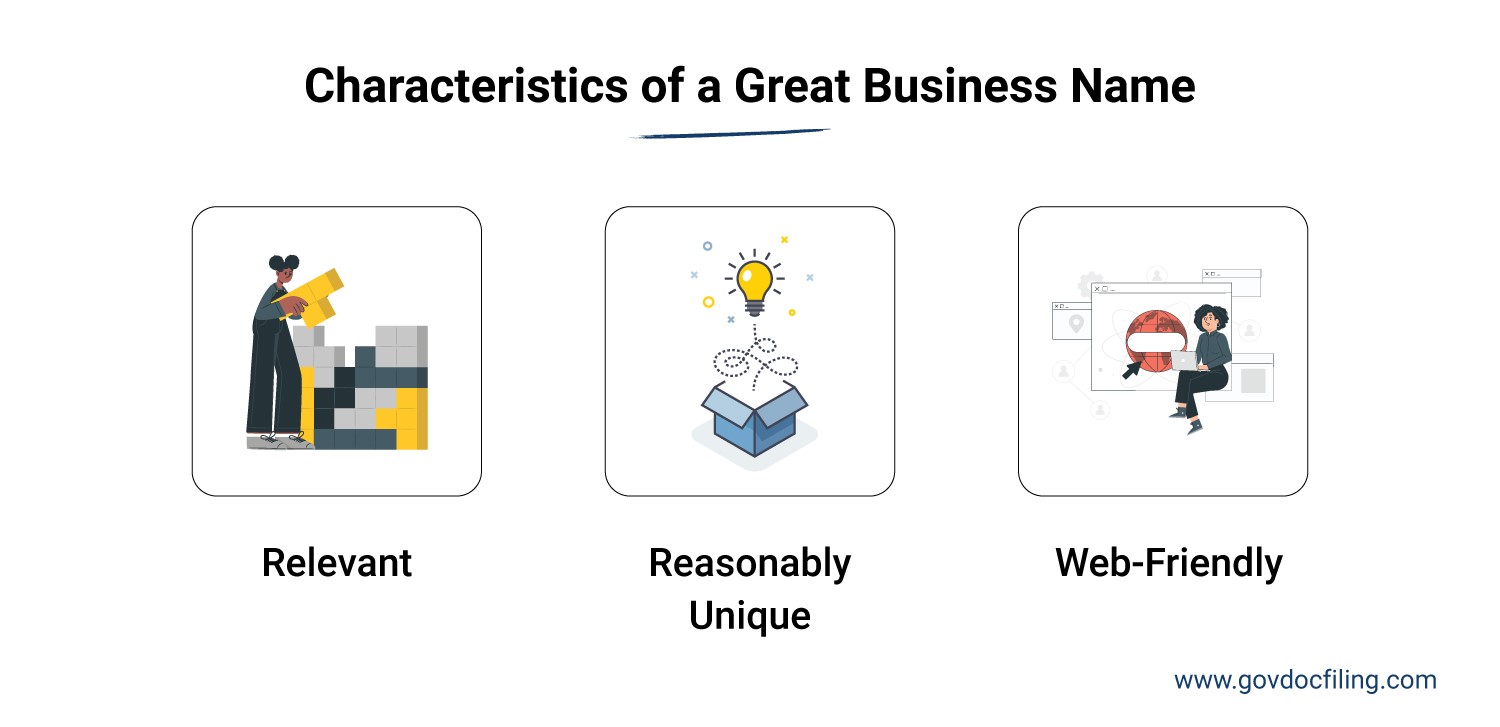
You probably have great ambitions for your business. However, your name should make sense for the current state of your business entity.
For instance, if you aspire to become a wholesaler one day, but are currently a retailer, the name should not have the name wholesaler in it yet. It could mislead your customers.
Potential customers should be able to tell what you do at a glance.
However, don’t get into specifics in your business legal name as this could limit your business.
For instance, don’t be too specific about the services you offer or the location of your business. Such a name becomes inappropriate as soon as your business expands its offerings or moves to new locations.
The tricky part about a business legal name is that no other company should have a similar name.
While giant companies are able to get away with extremely unique business names like “Exxon Mobil” a small business startup will find it challenging to get their audience to remember such a unique name.
The best business legal name will strike a balance between uniqueness, creativity, and memorability.
Of late, selling on the web is no longer an option for businesses. It’s necessary if you want to establish a stong presence online and reach more customers globally.
So, it’s critical to ensure that your business legal name is easy to remember if you choose to use it as your domain name too.
The Name is Timeless
Avoid choosing a legal business name based on trends and fads.
As trends evolve over time, your business name can quickly become outdated or irrelevant. Your business name should remain relatable and recognizable, even as market trends and customer preferences change.
A timeless business name can help build long-term brand equity, appeal, and stability.
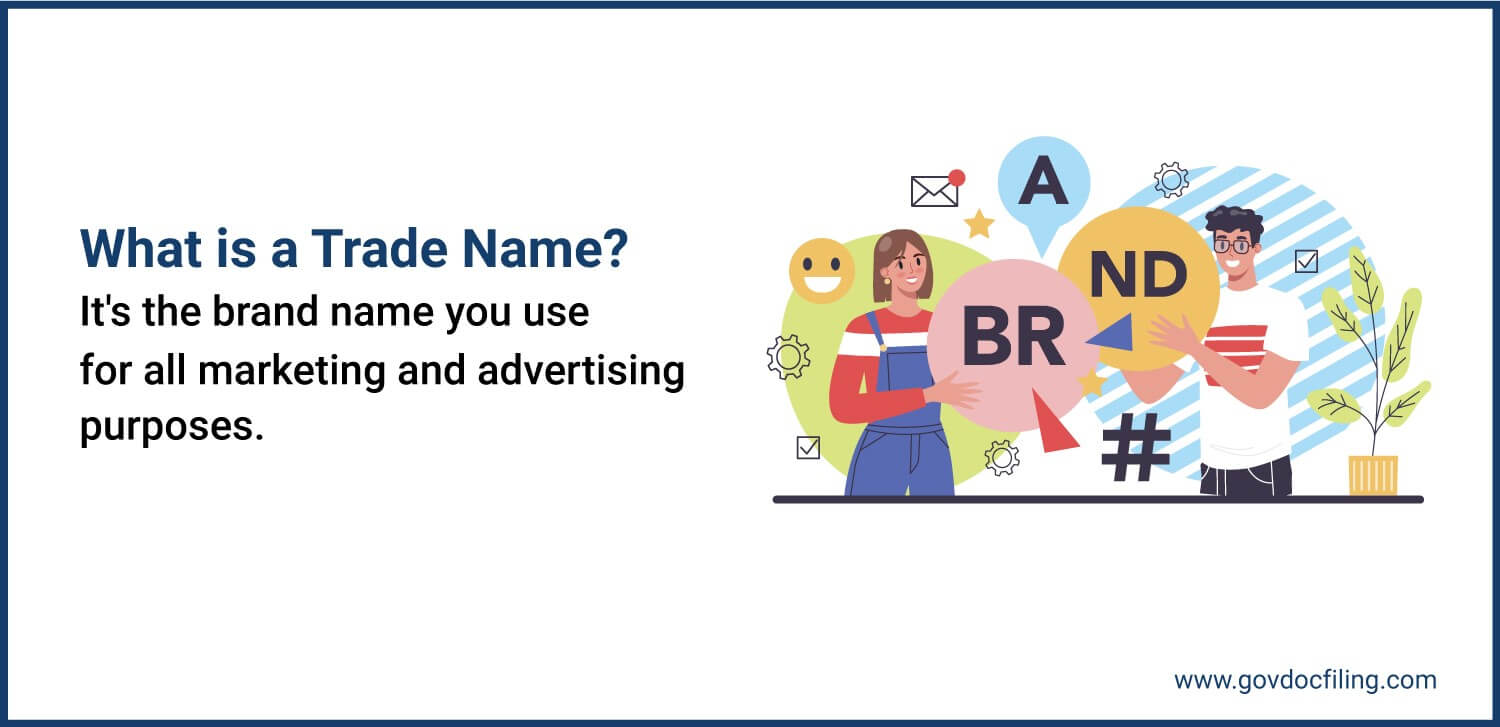
A trade name is your company’s brand name that you use for all marketing and advertising purposes.
It is also sometimes referred to as the “doing business as (DBA)” or fictitious business legal name, as you conduct your business using your trade name and not the legal name.
Your business’s trade name is the name that your customers recognize.
Trade names do not need to follow the same naming conventions like using the terms, “LLC,” “Corporation,” or your name if you are a sole proprietor.
You can choose a short and crisp trade name with which to do business and be easily recognizable to customers.
First things first — you can run your business even without a trade name. However, a trade name is a valuable asset that gives you a chance to make your business even more memorable for your audience.
If your business legal name is long, complex, or hard for your audience and customers to pronounce, they may not remember it.
In such a case, you can have a separate trade name under which you can market your business. This makes it easy for your consumers to remember your business, strengthening brand recognition.
For example, UPS is easier to remember than United Parcel Service of America, Inc.
A memorable name is important in that:
You can come up with a trade name that makes consumers aware of what they can expect from your product or service.
Whole Foods Market IP, Inc., for instance, is known by people simply as Whole Foods Market. And they’ve popularized this name by using it on their website and social media accounts.
They’ve even made Whole Foods Market a registered trademark for the company.

The name tells potential customers that the food they’ll find in this store is healthy and eco-friendly.
Your trade name doesn’t have to be similar to your legal one. It could be completely different too.
If your business has different products that are distinct from each other, you can use trade names to differentiate them.
For example, iPhone and iPad are distinct trade names, but they all fall under Apple Inc.
When customers consistently have positive experiences with your business, they begin to associate your trade name with positivity. For instance, each time they come across your trade name, they may associate it with quality products or reliable services.
This helps you build trust and stronger relationships, leading to increased customer loyalty and referrals.
A recognizable and reputable trade name may suggest that your business is well-established and has a solid market presence. This can make it more appealing to investors looking for stable and promising opportunities.
Similarly, potential partners may be more interested in collaborating with a business that has a strong trade name, as it indicates a certain level of market credibility.
Whether DBA registration is mandatory or not depends on the state in which your business is based.
Some states, such as Washington, require Sole Proprietorships, Corporations, Limited Partnerships, and Limited Liability Companies to register any trade name they are using when operating their business.
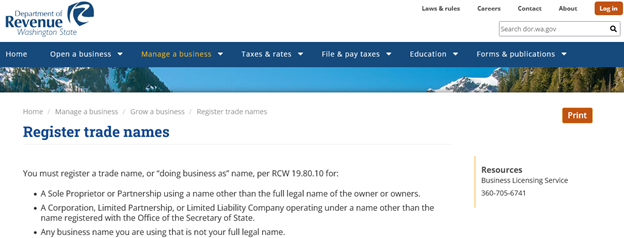
Unless it’s mandatory, the decision of registering a trade name is left for the business owner to make.
However, we recommend registering your trade name.
People are unlikely to use your business legal name when referring to your company. They’re likely to drop the “LLC” or “Inc.” and refer to it using the easiest part of the name or by the name of your products.
By registering a trade name, you enable customers to use it freely without the risk of misidentifying your business.
It means that you can include the registered details of your fictitious business legal name with your business bank accounts. Your clients can write checks using the more memorable trade name without having concerns that it’ll be rejected.
So, how do you register your company’s trade name?
For trade name registration, you will need to file for a DBA name.
The process of filing for a DBA varies from one state to another and sometimes from county to county. However, there are certain steps that remain common.
Here is the general process that you can follow to register a DBA or trade name:
You can use our DBA filing services to make the process easier. We will handle all of the business name paperwork and regulatory requirements on your behalf.
Keep in mind that registering a DBA does not mean that you’ve formed a legal entity.
Registering a DBA without first forming a legal entity like a Limited Liability Company or other business structures is a mistake. The state will automatically recognize your business as a Sole Proprietorship instead. So, make sure you’ve registered your business legal name first before getting a trade name.
Some major advantages of using a DBA include:
In some states, registering your company’s trade name does not stop other business entities from using the same trade name.
The only way to gain an exclusive right to a trade name is by registering the name as a trademark. It can provide legal protection to your trade name by blocking other businesses from using it in a way that confuses your customers or dilutes your brand identity.
This is what Apple has done with its trade names, such as iPhone.
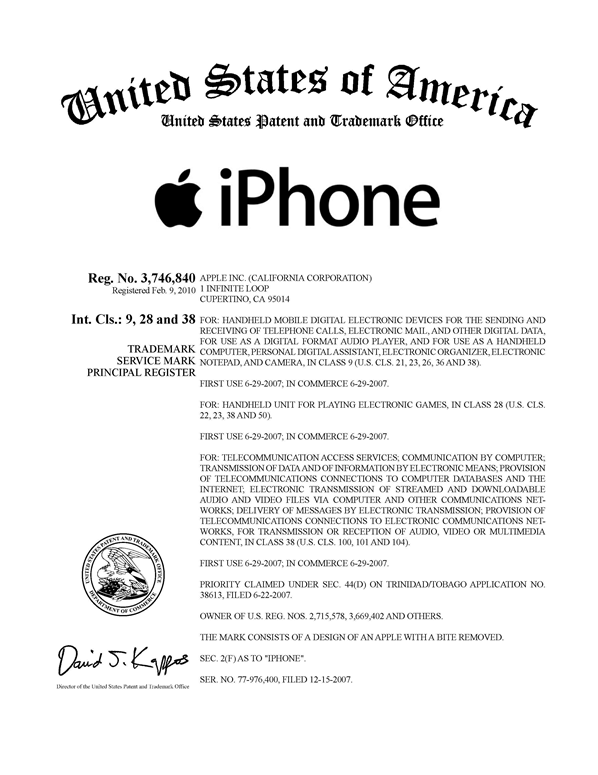
What’s more, a trade name might restrict how you brand your business if it’s too specific or doesn’t align with changes in your business model.
Some states also require you to renew your trade business name every few years. This means extra costs for your business.
You might also have to register the trade name for your business afresh every time you’re conducting business in a new jurisdiction.
Although these two names may sound similar or even overlap in some cases, they have entirely different meanings.
As mentioned earlier, a trade name is the name under which your business operates and presents itself to the public.
On the other hand, a trademark is a type of intellectual property that grants you exclusive rights to use specific names, symbols, logos to distinguish your goods or services. You can trademark your trade name with government agencies to enforce legal protection.
Your chosen trade business name infringes upon a trademark when it’s so similar to the registered trademark that it causes confusion amongst consumers. For instance, if your trade name leads consumers to mistakenly believe that your product or service comes from the trademark holder, it may be termed an infringement.
Whether you want to conduct business using your legally registered business name or a trade name is completely up to you.
However, using a trade name offers certain advantages for all businesses, regardless of their entity type.
Trade names can be much shorter than a business’s legal name and are likely to be more memorable for your customers. It is also beneficial to use trade names if your company has several separate businesses that operate as a part of the larger company.
If you choose to use a DBA name, you need to register it as a DBA (doing business as) per your state guidelines.
You can use our services for a quick DBA filing and make the process quicker and easier. We will handle the filing process end-to-end and take care of all of the boring paperwork for you.
1. Are business legal names and trade names the same thing?
No, a business legal name is your company’s legal name while a trade name is the one you use for your day-to-day activities and marketing materials.
A trade name is also the name that your customers know and recognize your business as.
It’s a requirement for every startup to register a business legal name but using a DBA or trade name is completely optional. They can use the same name for sales purposes too.
2. Why do businesses use a trade name?
Businesses generally use a DBA name if:
However, this does not mean that small businesses or sole proprietors can’t use a DBA name.
3. What do you mean by “doing business as” or DBA?
Doing business as or DBA name refers to the name that a company uses for its day-to-day business operations and marketing purposes.
It is also known as the trade name, assumed name, or fictitious name of the business.
4. Do all businesses have a separate trade name?
No, using a DBA name is a choice and not all businesses make that choice.
There are many businesses that use their business legal name to conduct business.
5. How can I register a trade name for my business?
Here’s how you can register a trade name for your business:
There you have it, business legal name vs. trade name.
Choosing a good legal business name is very important. Make sure the name represents what your new company does in the right way. It should be short and easy to remember while also being unique.
If you change your mind or feel like you need a better name, you can always use a trade name later.
A trade name keeps your brand in your customers’ minds.
If you have several small businesses operating under one large company, you can even use multiple trade names.
Just make sure that you register your trade names and follow all of the necessary steps required by your state and local laws to file for a DBA.
Do you need help filing for a DBA name for your business? Book the DBA filing service now and let us handle the process for you.
The first step is to choose which entity classification is right for your business. If you are unsure, take the easy survey and find out which one is best for you!
The second step is to submit an application for a Tax ID number from the IRS. You will receive your Tax ID online, quickly and easily.
Get free business tips, resources, and articles straight to your news feed.
Easy Doc Filing, LLC, and its employees, agents, and representatives, are not affiliated with the Internal Revenue Service (“IRS”) or any other governmental or regulatory body or agency. Easy Doc Filing, LLC provides paid services to obtain Federal Tax Identification Numbers from the IRS. As a “Third Party Designee,” pursuant to IRS Form SS-4, Easy Doc Filing, LLC prepares and submits applications for an Employer Identification Number (“EIN”) to the IRS on behalf of its clients. Easy Doc Filing, LLC does not verify EIN application submissions and is not responsible for the accuracy of the information provided. Any individual may obtain and submit his or her own EIN application at no cost through the official IRS website at www.irs.gov Easy Doc Filing, LLC may derive revenue from the partnerships we have entered with, and/or our promotional activities may result in compensation paid to Easy Doc Filing, LLC. Fundbox makes capital available to businesses through business loans and lines of credit made by First Electronic Bank, a Utah chartered Industrial Bank, member FDIC, in addition to invoice-clearing advances, business loans and lines of credit made directly by Fundbox.
Use of this website does not make you a client, or a prospective client, of Easy Doc Filing, LLC. Easy Doc Filing, LLC makes no warranties or representations, express or implied, regarding the information on this website. Easy Doc Filing, LLC is not liable for any and all damages resulting from the use of, reference to, or reliance on information provided on this website. It is provided for general informational purposes only and does not constitute advice of any kind. For convenience, this website may contain links to third-party websites. Easy Doc Filing, LLC does not control, endorse, or assume responsibility for the nature, content, accuracy, and availability of such websites. Easy Doc Filing, LLCdoes not guarantee availability of Website and is not responsible for temporary unavailability due to technical issues.
Easy Doc Filing, LLC is not a law firm and does not offer legal advice or recommendations. Communications with Easy Doc Filing, LLC are not protected by attorney-client privilege in any way. Any individual who needs legal assistance must contact an attorney or law firm licensed in his or her jurisdiction.